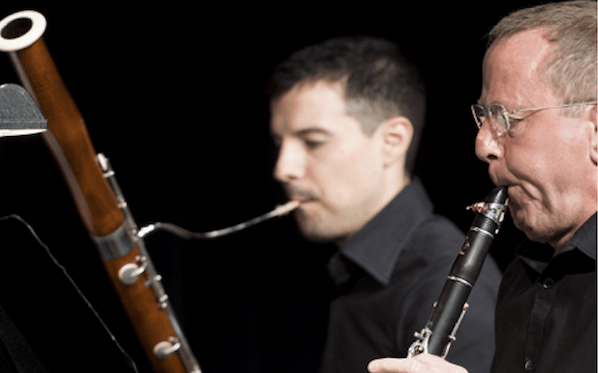Frigid temperatures did not keep a near-sold-out crowd from the Knoxville Symphony’s Q Series concert at noon Tuesday at the Square Room, the performance space in back of Café 4 on Market Square in downtown Knoxville.
Aside from the buffet meal that’s provided by Café 4, that’s included in the ticket price, the audience was treated to performances by the KSO two small chamber music ensembles, the KSO Woodwind Quintet and the KSO Principal String Quartet.
The players in both groups have been playing together for a while now and their music is high-level chamber playing, that special assembly that is musicians having a scripted conversation through their instruments. It’s theater with music instead of words.
Yesterday’s performance began with the Woodwind Quintet: Hannah Hammel, flute; Claire Chenette, oboe; Gary Sperl, clarinet; Aaron Apaza, bassoon; and Jeffery Whaley, French Horn, playing Jacob Gade’s “Tango Jalousie.”
Born in 1879 in Denmark, Gade struggled to find a place for himself in the world of music. Not much of his music found traction until he wrote “Tango Jalousie,” the only piece for which he is remembered today. He really wanted to write waltzes. But, in the 1920s, a story he read in the paper about a man who murdered his wife because of jealousy turned out to be the spark his creative imagination needed. Originally written for solo violin and piano.
The piece was heard in both Europe and America in more than 100 movies and numerous television shows. By the 1970s it was said that the tune could be heard somewhere in the world every four minutes. The royalties finally provided a handsome income.
The woodwind quintet arrangement was written for the 20th anniversary celebration of the coronation of Queen Margaret of Denmark in 1992. Judging by the applause yesterday’s audience gave it, the Quintet’s sassy performance clearly brought back fun memories for many of the seniors.
It also set up Adam Schoenberg’s “Winter Music,” a more complex and adventurous piece that the Quintet tore into with delight.
Every young composer finds himself borrowing bits and pieces of music by composers they admire. As the gifted Schoenberg finds his own clear voice, one could hear Copland’s harmonies that have that unique internal glow, Ives’ sense of childish delight and even moments of Philip Glass.
That’s not to say that this Schoenberg isn’t original. It is. And listening to the Quintet play it was a treat.
The voices in this quintet are balanced. They seem to enjoy playing together. One of the pleasures of listening to chamber music, well played, by a group that is having fun, is the sense that you, the listener, are eavesdropping on a conversation.
The mood shifted when the Quintet switched to short seasonal pieces. If they appeared to be having fun with the Schoenberg, their jazzy “Christmas Time is Here,” music from “Charlie Brown’s Christmas,” was a blast.
Their arrangement of “Adeste Fideles” (“Oh Come All Ye Faithful”) had a high-brow, dress-up quality. But during “Sleigh Ride,” they invited an audience member to play the sleigh bells, normally attached to a horse’s harness. But the horse, this time around, was one that had eaten too many apples spiked with brandy, including a whinny from the French horn at the end.
It took some time for the KSO Principal Quartet to begin playing. Cold temperatures are not very nice to string instruments, making tuning difficult.
But Arcangelo Corelli’s “Concerto Grosso in G Minor,” Op. 6 No. 8, widely known as the “Christmas Concerto,” perfectly suited them. The third movement, in particular, showed the maturity of this quartet, which has also been playing together for a while.
They are no longer just four orchestral musicians who are the principals of their instrumental section of the orchestra. They were four soloists, playing together, the definition of a quartet.
By the time they got to their holiday selections, the four: first violin Gordon Tsai, second violin Edward Pulger, violist Kathryn Gawne and cellist Andy Bryenton, were ready to cut loose.
Everyone had their turn at the lead in “You are a Mean One, Mr. Grinch,” but Tsai, in particular, ripped through it as happily as any jazz violinist. Originally written for the 1966 cartoon television special “How the Grinch Stole Christmas,” it’s just a fun piece.
The quartet’s closing “All I Want for Christmas” was, indeed, a gift to the audience that ought to make anyone’s Christmas better.

